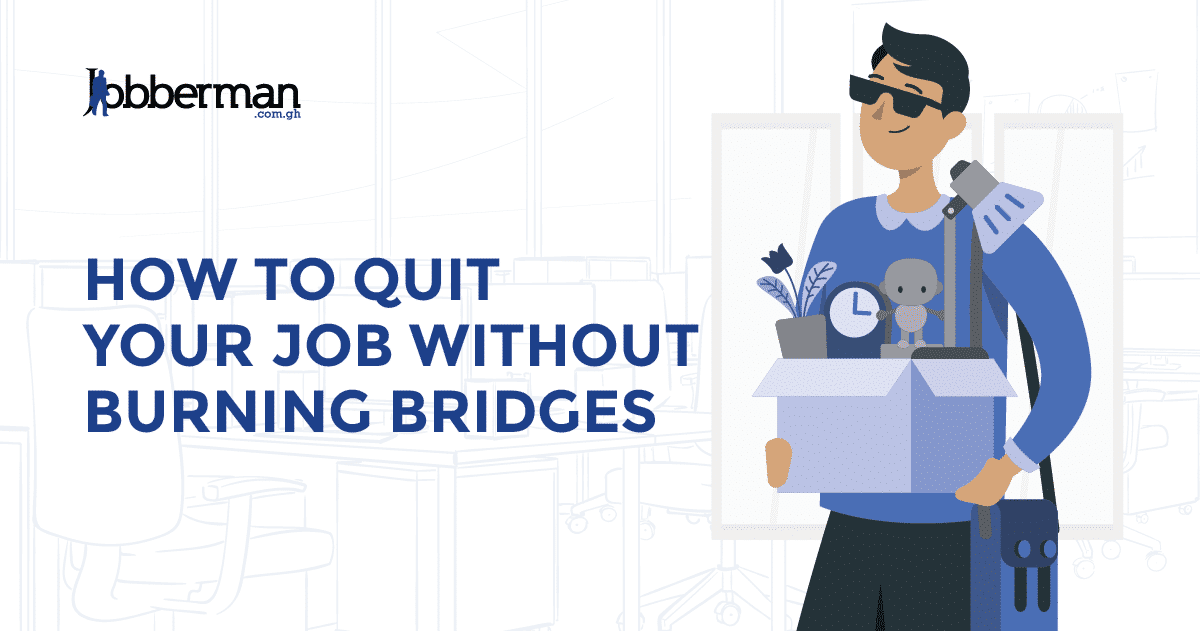The average worker today stays on a job for 4.6 years. You are likely to quit a job a couple of times in your professional career, if you haven’t already. You will find that the processes involved in quitting a job is dogged with never ending questions of professional courtesy.
Who should you tell first? How much notice should you give? And how honest should you be about your reasons for quitting?
Generally, people tend to spend a lot of time to make remarkable first impressions, but rarely give much thought to last impressions. Quitting a job, like acquiring a job requires caution, sensitivity and planning. Here is what to do when you decide to quit your job.
Table of Contents
1. Offer a Smooth and Orderly Transition
You may be ecstatic about leaving your job but it is important to offer a smooth and orderly transition. You can do this by offering, your employer between two weeks and a month notice. The higher up you are in an organization, the longer it will take to extricate yourself and possibly train a prospective replacement. It is important to note that the moment you notify co-workers about your intendment to leave, organizational cohesion and team-building may take on a different dynamic. It is likely you may be perceived as an outsider and not be invited to certain meetings. You don’t want to be hanging around too long. Between two weeks to one month notice is probably enough.
2. Inform Key People in The Organization
The first person you need to inform is your direct supervisor. The reason is simple. It is impolite for your supervisor to hear the news of your imminent departure from someone else. After deliberating on your intendment with your supervisor, you’re no longer in the driver’s seat. Any decision relating to the nature and timing of your departure is best left up to your supervisor.
Again, you must inform key people in the organization to keep the rumour mill at bay. It is also necessary to consider how your resignation is communicated to the entire organization, whether in a team meeting or in an email.
3. Be Transparent
You are under no legal obligation to reveal your next career move. You must consider how ever that in this hyper-connected world, your former employees will eventually know all about your new role and new company. It is useful to be straightforward and honest about your plans because that way you own the narrative. Your former employees and co-workers are a crucial part of your professional network. The more transparent you are, the more likely you are to preserve and build on the relationships you already have.
4. Be Strategic About Your Time
Regardless of your reasons for quitting, it is always useful to engender an orderly and positive transition. It must be your overriding objective to not leave your boss in a pickle. To that end, you need to collaborate by requesting for directions and close supervision on how you ought to tie up loose ends.
5. Express gratitude
You may be ecstatic about leaving your job but you need to grow beyond that to portray an appreciative impression to your boss and co-workers. Modest farewell gifts or thoughtful notes to your direct supervisor, management and co-workers leave a good impression. You may be dealing with a supervisor who is taking your departure personally and acting emotionally or accusing you of disloyalty, you need to just chalk it up to collateral damage and move on. It’s not productive to waste your time and energy trying to change their minds.
6. Beware the exit interviews
You may be tempted to be brutally honest during your exit interview and offer up detailed information on everything that’s wrong with your company. The exit interview is not the time to give the feedback you wished you had given while you were a full-time employee. The reasons are simple. First, you’re not guaranteed anonymity; it’s a small world. Second, your feedback is not going to change the organization. If you like your job and had a wonderful relationship with your boss but got a better offer, feel free to talk about it, but don’t feel obliged.
Remember if you decide to look for a job, there are a hundreds of job opportunities on Jobberman now. Find your dream job here.
Quitting work: when Is A Good Time To Quit Your Job?
One will think that the obvious answer to the question of when to quit a job is when one doesn’t want to work there anymore. The nuances of quitting your job however are more complex than walking away on a whim. You have to take into consideration a lot factors from your finances to your ambitions and the fluidity of the job climate and above all the validity of the reason why you want to quit. Sometimes, people have a streak of bad days at work where they swear to leave the job and never return. This could be a temporary situation, try not to make a permanent decision based on it. When then is a good time to quit your job or start looking for a new one?
When your health is affected
It is never acceptable to sacrifice your health on the altar of a job. When you realize that your job is beginning to take a toll on your physical and mental health, or you need to rely on alcohol narcotic and other harmful substances, that is good time to quit your job before you suffer a full blown breakdown.
You hate your job
At some point in time, everyone has felt like they hate something about their job or has blurted out “I hate my job” out of exasperation. When your job becomes more of a chore than it ought to be, such that you would rather be anywhere else or doing anything else than your actual job, you need to start looking for an exit plan.
The work is too easy
When you feel like you are capable of much more, and you could do your job without putting in any thought or creativity, you are better off in a more challenging role. Many people take jobs that are below their qualification as placeholders while they find their ideal role. So the moment you begin to feel too qualified for your current role, think of looking for an alternative and more challenging job opportunity.
When you find a better offer
Many people have learnt the hard way; that remaining loyal to an employer at your own expense is not a good idea. When you do find an offer that promises you a better opportunity than the one you currently have, the is no better time to send in a resignation or start considering the option to quit your job. However ensure you take some time to evaluate the new offer, and decide whether moving is a good idea or not. Look at things like benefits, work culture, room for career growth e.t.c. You wouldn’t want to jump from a frying pan right into the fire. Career changing mistakes can be quite costly.
If you are reading this…
If you are interested in an article that may recommend that you change your job, surely everything is not right at the job and you need to start looking elsewhere. If your current job role poses a lot of doubt and uncertainty, it is not a healthy environment for a thriving career. If you are unsure about working in a particular place, you probably shouldn’t.





